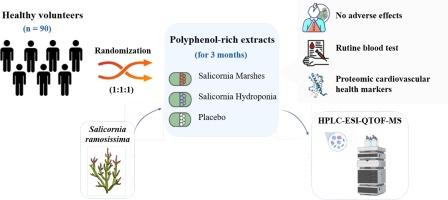Dietary supplementation with polyphenol-rich Salicornia ramosissima extracts: Assessing safety, efficacy, and impact on cardiovascular health biomarkers in healthy volunteers
IF 3.8
2区 农林科学
Q2 FOOD SCIENCE & TECHNOLOGY
引用次数: 0
Abstract
The importance of diet in preventing non-communicable diseases is well established, with polyphenol consumption suggested to impact cardiovascular disease development. Salicornia ramosissima synthesizes high amounts of phytochemicals under environmental stress. In a randomized controlled clinical trial on 90 healthy volunteers, we evaluated the safety of supplementation with 1 g of polyphenol-rich S. ramosissima extracts from salt marshes and hydroponic sources over three months. No differences in adverse effects were observed between extract-treated and placebo subjects. Salicornia extract from marshes (SM) increased glomerular filtration rate and reduced LDL cholesterol. SM treatment also modulated plasma markers related to cardiovascular disease: MERTK, Gal-9, ADM, TF, PRSS27, HAOX1, IL-18, PAPPA, TNFRSF1A, TIE2 and FGF-21 proteins were downregulated while SRC levels were upregulated. Therefore, under the studied conditions of use, Salicornia extracts consumption is safe and SM induced biochemical and proteomic changes related to cardiovascular health.

膳食中补充富含多酚的盐肤木提取物:评估安全性、有效性以及对健康志愿者心血管健康生物标志物的影响
饮食对预防非传染性疾病的重要性已得到公认,多酚的摄入量被认为会影响心血管疾病的发展。在环境压力下,Salicornia ramosissima 可以合成大量的植物化学物质。在一项针对 90 名健康志愿者的随机对照临床试验中,我们评估了在三个月内补充 1 克富含多酚的盐沼泽和水培植物提取物的安全性。在萃取物处理过的受试者和安慰剂处理过的受试者之间没有观察到不良反应的差异。沼泽中的盐肤木提取物(SM)提高了肾小球滤过率,降低了低密度脂蛋白胆固醇。SM治疗还能调节与心血管疾病相关的血浆标志物:MERTK、Gal-9、ADM、TF、PRSS27、HAOX1、IL-18、PAPPA、TNFRSF1A、TIE2 和 FGF-21 蛋白下调,而 SRC 水平上调。因此,在所研究的使用条件下,食用水杨梅提取物是安全的,SM 可诱导与心血管健康有关的生化和蛋白质组变化。
本文章由计算机程序翻译,如有差异,请以英文原文为准。
求助全文
约1分钟内获得全文
求助全文
来源期刊

Journal of Functional Foods
FOOD SCIENCE & TECHNOLOGY-
CiteScore
9.60
自引率
1.80%
发文量
428
审稿时长
76 days
期刊介绍:
Journal of Functional Foods continues with the same aims and scope, editorial team, submission system and rigorous peer review. We give authors the possibility to publish their top-quality papers in a well-established leading journal in the food and nutrition fields. The Journal will keep its rigorous criteria to screen high impact research addressing relevant scientific topics and performed by sound methodologies.
The Journal of Functional Foods aims to bring together the results of fundamental and applied research into healthy foods and biologically active food ingredients.
The Journal is centered in the specific area at the boundaries among food technology, nutrition and health welcoming papers having a good interdisciplinary approach. The Journal will cover the fields of plant bioactives; dietary fibre, probiotics; functional lipids; bioactive peptides; vitamins, minerals and botanicals and other dietary supplements. Nutritional and technological aspects related to the development of functional foods and beverages are of core interest to the journal. Experimental works dealing with food digestion, bioavailability of food bioactives and on the mechanisms by which foods and their components are able to modulate physiological parameters connected with disease prevention are of particular interest as well as those dealing with personalized nutrition and nutritional needs in pathological subjects.
 求助内容:
求助内容: 应助结果提醒方式:
应助结果提醒方式:


